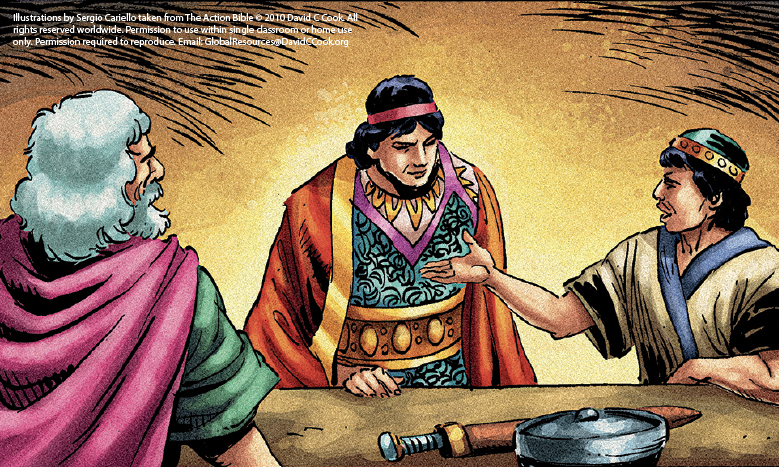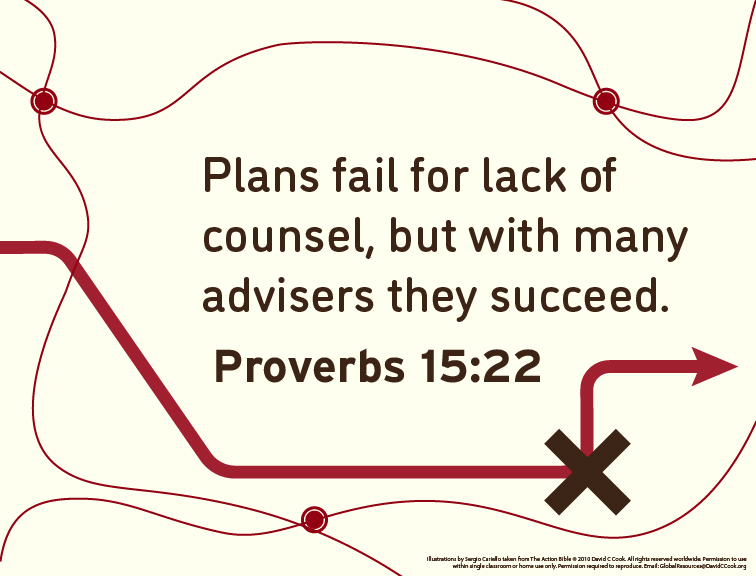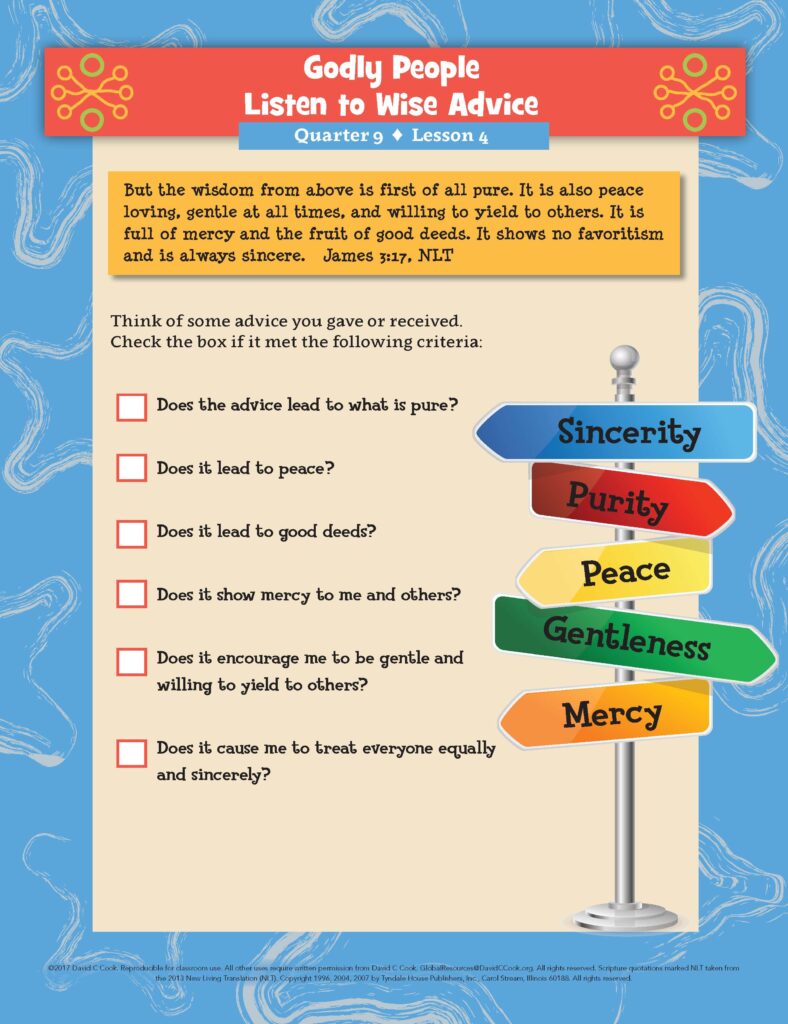During the lesson, the information for you to know is written in regular type, and what we suggest speaking or reading aloud to children is in bold. All resources for this lesson, including the Teacher Guide, Student Page, Family Connection Card, and other resources can be downloaded in a ZIP file by clicking on the following link:
In some lessons you will find "resource articles." These are articles written by experts from around the world to help equip you for your work with children and adolescents. Share them with parents or guardians if you consider it appropriate.
But the wisdom from above is first of all pure. It is also peace loving, gentle at all times, and willing to yield to others. It is full of mercy and the fruit of good deeds. It shows no favoritism and is always sincere.
James 3:17, NLT
When we face situations where we need wisdom, we often rely on ourselves. We make our decisions based on our own ideas or experiences. However, because we often react with anger or selfishness, relying on ourselves often leads to a worse situation since we are often given to selfish or angry reactions. It is also easy to seek advice from those who will tell us what we want to hear instead of seeking godly advice.
God says that He will freely give us wisdom from above—from Him. In James’ description of wisdom, notice that many of these qualities are also listed as fruit of the Spirit (Galatians 5:22). This is because they flow from the One for whom these qualities are part of His very nature. Scripture also tells us that Jesus became wisdom for us (1 Corinthians 1:30). As we seek to know Jesus more deeply, we will become more like Him and will show these qualities as well. Spend time this week in the presence of Jesus, the wisdom of God.
Share with the families that today’s lesson is about listening to wise advice. Family members can ask their children to share how they can know if advice is wise and godly.
Teacher Tip: If possible, email or text the Family Connection Card to the families of your students.
Greet the children coming into class with a warm smile. You set the tone of the class by your excitement and smiles.
Start today’s class by playing a game. Clear an open space in your class area. Ask the children to stand in the centre. You will ask some questions. For each of the 4 possible answers, point to a different area of your space. The children will choose their answers and race to the corresponding areas. After all the children have chosen, have them return to the centre for the next question. Do this for all the questions.
Which would you rather eat? Cake? Rice? Fruit? Beans?
Which would you rather do? Visit a relative? Go to the city? Talk with a friend?
Play football?
Have the children sit down and ask them:
Did any of you choose your answer based on what others were doing? If so, why?
There will usually be some children who chose answers that were different than what the majority of the children chose. Ask the following question to one of those children:
How did it feel to choose something different?
Ask the following question if no one chose differently than the majority.
How do you think it would feel to be the only person who chose differently?
Sometimes people do or choose things because they listen to unwise advice instead of seeking godly advice and following God’s wisdom. It is often easier to go along with what everyone else is doing. Let’s hear about a king who made an unwise decision because he listened to unwise advice. Then we will hear about someone who always listened to God’s wisdom.
Remember that we talked about Solomon, king of Israel, who was a very wise king. God had given him wisdom and power and wealth. When Solomon died, his son Rehoboam became king.
Optional: If possible, share the image from The Action Bible.

Rehoboam was only king for a short time when the people from the northern part of his kingdom came to see him. They hoped that they could convince King Rehoboam to treat them better.
“Your father was a hard master,” they said to Rehoboam. “We had to do all kinds of hard work for him. We had to pay him lots of taxes,” they complained. “Lighten our harsh workload. Reduce the heavy taxes that your father made us pay. If you do that, we will follow you.”
Rehoboam told them, “Give me 3 days to think about this. Then come back and I will give you an answer.”
What do you think Rehoboam did during that time to help him make a decision?
Allow children to offer their thoughts before continuing the story.
It would have been good if Rehoboam had prayed and asked God for wisdom. But Rehoboam did not do that. Instead, King Rehoboam called together the elders who had been his father’s advisers.
“What is your advice? How should I answer these people?” he asked.
The older, wiser advisers replied, “If you are willing to be a servant-leader to the people and give them a kind answer, they will always be your loyal followers.” They advised him to do what the people asked.
Rehoboam decided to ask the young men who had grown up with him the same question. He had appointed them to be his advisers now that he was king. He asked them the same question. “What is your advice? How do you think I should respond to these people who want me to be more kind to them?”
The young men replied, “You should tell those complainers to go home. You are king. Tell them that you are a better king and more powerful than your father. If they thought your father was hard on them, you will be even harder. Tell them if they do not follow you, you will punish them much more than your father ever did. They need to know who is in control.”
Whose advice do you think Rehoboam followed?
When the people came back 3 days later for the answer, King Rehoboam spoke harshly to them. He rejected the advice of the older, wiser advisers and listened to his friends. He told the people, “If you thought my father put heavy workloads and taxes on you, wait until you see what I do! I will demand even more of you!”
So the northern people rejected him as king and went back home. From that time on, the northern and southern parts of Israel became separate nations and were often at war with each other.
Rehoboam made a serious mistake. What was it?
Rehoboam followed the bad advice of his friends and ended up with a divided kingdom. He did what he wanted to do and what his friends wanted rather than seeking God’s wisdom.
What were the consequences of Rehoboam’s decision for Israel?
The kingdom was divided, and north and south fought against each other.
Why do you think Rehoboam listened to his friends instead of seeking God’s wisdom?
Sometimes when we need to make a decision, we think we have to do it on our own. Sometimes we even want to do it on our own because we do not want to listen to anyone else. Or we may we have had to depend on ourselves because there was no one around to ask for advice. But God wants us to seek wise advice. Listen to this verse:
If you are using the Memory Verse Poster, show it to the students.
Plans fail for lack of counsel, but with many advisers they succeed.
Proverbs 15:22

God wants us to seek good advice. Listen to what we can learn from Jesus’ life and who He listened to.
Read the following verses from your Bible if possible.
I do nothing on my own but speak just what the Father has taught me. The one who sent me is with me; he has not left me alone, for I always do what pleases him.
John 8:28–29
Who did Jesus listen to?
God, the Father.
One day some men came to Jesus, who was teaching in the temple. They brought a woman whom they had caught doing something sinful. The Jewish law required that she be punished by stoning her to death. The men expected Jesus to forgive the woman, which would be against the law. They tried to trick Jesus by asking if they should stone her. Let’s listen to Jesus’ response.
Let any one of you who is without sin be the first to throw a stone at her.
John 8:7
Jesus knows that everyone is sinful. His wise answer was to show these men that they were also sinners. One by one, they realized that they were sinful and left. After all of the men left, Jesus told the woman that He did not accuse her and told her to stop sinning.
Because Jesus always listened to His Father, He always had wisdom for each situation. He responded to each situation in ways that were helpful and honoured God.
Have you ever listened to advice and it turned out badly? What happened?
Some of the worst decisions in the history of the world were made because people listened to bad advice instead of seeking good advice and asking God for wisdom. Let’s learn how to tell if advice is good or not.
Read the following verse aloud:
But the wisdom from above is first of all pure. It is also peace loving, gentle at all times, and willing to yield to others. It is full of mercy and the fruit of good deeds. It shows no favoritism and is always sincere.
James 3:17, NLT
Remember that God will give us wisdom when we ask Him. We can also ask those around us for advice. When we ask for advice, we can test it to see if it is like God’s wisdom. We can ask if it matches what we heard in the verse I just read.
If you can answer yes to those questions, then the advice is godly advice. God gives us wisdom through His Word, through what the Holy Spirit speaks to us, and through others. God’s wisdom will always match what is in His Word.
Optional: If you are using the Student Pages, allow the children to respond on them.

Take a moment to think of a situation in your own life where you need wisdom. You may have a disagreement with someone and do not know how to resolve it. You may have a need and do not know how it will be met. You may be struggling with what someone did to you and do not know how to begin to forgive or heal. God cares about each of your problems. He promises to be with you and help you.
Allow the children 1 or 2 minutes to think about situations in their own lives.
Optional Supplies:
Give children paper and pencils or crayons. They can draw or write their situations.
After you draw the situation, write the word “wisdom” on the bottom of the page using big letters. That is what God promises to give you when you ask Him. Share your picture with 1 friend.
End of Option
Let’s all stand up and show that we want to ask for wisdom in our situations. Now use your body to create a pose that shows you are seeking wisdom and good advice. For example, you may kneel in prayer or tap your head to show that you want wisdom. Remember you can seek wisdom from God and from other people. Once you get in your pose, stay there until I have spoken the blessing over you.
Allow a minute for the children to get in their poses, then speak the blessing from Psalm 32:8 over the children.
Blessing: May you know that God will instruct and teach you. He will counsel you and lead you with His loving eye on you. He will help you learn to find wise advice.
Lead the children in singing this quarter’s song, if possible. (soft return here)
Life on Life ©2020 David C Cook. Reproducible for home or classroom use only. All other uses require written permission from David C Cook [email protected]. All rights reserved.